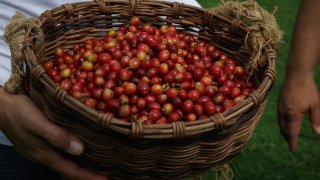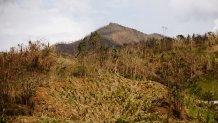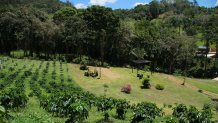
Hector Muñoz owns a coffee farm in San Lorenzo, Puerto Rico, and hurricanes aren't the only natural disasters he's worried about.
"If a drought comes it could be catastrophic," he said.
He has reason to be concerned. Powerful El Niños are expected over the next decade and they typically bring drought conditions. Adding to the challenge is the possible impact of climate change making the droughts more severe and allegations that the government agency tasked with helping the industry adapt isn't up to the job. The head of the island's Department of Agriculture is, for example, being investigated for what the government calls "improper behavior."
The Threat From Natural Disasters
In 1994, Puerto Rico saw one of its biggest droughts in history with losses of more than $165 million. Another dry period was registered in 2015, leaving at least $14 million in damages, the island's Department of Agriculture reported. After hurricanes Irma and María, the financial hit exceeded $2 billion.

Recent disasters took a toll on Muñoz's farm, Hacienda Muñoz, which generates $300,000 in sales in a normal year. He lost approximately $130,000 from the 2015 drought. After Hurricane María in 2017, the blow was half a million more in damages, he said.
The coffee sector has been fighting for years to increase productivity and before the hurricanes hit in 2017, farmers were expecting to have a good year. Production levels were estimated to reach 40% of the coffee Puerto Ricans consumed that year, up from the 20% of previous years. Overall, the island imports most of its coffee to meet demand.
U.S. & World
Procafé, a nonprofit organization created post-Hurricane Maria to help the coffee industry bounce back, is concerned that another drought could threaten the progress it has made.
"We are not prepared," said Procafé's president, Iris Jannette Rodríguez.
This year could be a warning sign of things to come. In 2019, the island saw signs of drought, but not as intense as from a few years ago.
Experts say that some dry periods are good for the coffee plant, but extreme droughts are harmful. A trend toward severe dry periods could continue for Puerto Rico and other Caribbean islands, according to a recent study.
Stronger El Niños and the Possibility of More Intense Droughts
The National Academy of Sciences, a nonprofit organization of researchers, published a study in its journal PNAS in October that found stronger El Niños are expected over the next decade. Changes in the planet's temperature might be impacting the strength of Los Niños. That means the effects of El Niño could get worse.
El Niño, a climate phenomenon considered a regular part of the natural cycle, typically brings dry air and cold water to the Atlantic. La Niña does the opposite, causing more hurricane activity in the Caribbean. Frequency among Los Niños are usually irregular, but on average they have been occurring every two to seven years for more than a century. They typically last nine to 12 months, but could extend for years.
When El Niño happens, Puerto Rico, Cuba, Dominican Republic and other places in the Caribbean register an increase in droughts.
"We expect droughts will be more intense," said Toby Ault, professor of Earth and Atmospheric Sciences at Cornell Engineering.
"Air is getting warmer," he said. "This makes droughts even worse."
Ault and Dimitris Herrera, a postdoctoral associate at Cornell Institute for Climate Smart Solutions, have been studying droughts in the Caribbean very closely.
Starting in 2013, a powerful drought put at risk food security and access to water across the Caribbean. Catalogued as the Pan-Caribbean drought, experts say this dry period, which lasted three years, got worse with El Niño's arrival during 2015 to 2016.
In the last four years, Cuba has faced one its biggest droughts in more than 100 years. In 2017, the island saw a rain deficit in at least 45 municipalities of the island, a report from the Meteorologist Institute of Cuba found.
In the Dominican Republic, lack of precipitation has placed the island's agriculture sector at similar risk. Herrera, whose family still lives on the island, says the drought has put some farmers out of work. "They abandon their fields and move to the coast to work in tourism," he said. Data published by the Dominican Republic's Agriculture Ministry says agriculture employment fell 23% from 2013 to 2016.
Rain registered from hurricanes Irma and María helped the islands make some recovery, but it wasn't enough.
"Droughts don't get enough attention," Ault said. He is worried about the implications this could have in the future, if governments don't start paying attention.

Government Action and Allegations of Favoritism
This year, the Puerto Rican Senate passed a resolution giving the Agriculture Commission the responsibility of investigating what techniques the territory's Department of Agriculture is using to battle the effects of droughts.
Puerto Rico's secretary of agriculture, Carlos Flores Ortega, told NBC that while there are no available techniques to battle droughts' aftermath, preventive techniques can be put into action. But it's up to farmers to apply them or not, he said.
Usually these techniques are expensive. Muñoz has made two investments for an irrigation system. He lost the first one after Hurricane María. Now he is in the process of installing a new system and building a well. He has spent more than $50,000 in both investments, he said.
Flores Ortega says these systems are not appropriate for the mountains and are too expensive. He says that farmers' best case scenario is to plant shade trees that help maintain the soil's moisture.
Although Rodríguez, with Procafé, agreed that having effective irrigation systems in the mountains is difficult, she said more has to be done. "We should be developing other alternatives," Rodríguez said.
The University of Puerto Rico has two campuses where researchers have been working on ways to help increase agriculture productivity. But the programs could be at risk, in the face of a reduction in funding. The island carries more than $70 billion in debt and has been facing a financial crisis for over 10 years. "We've seen cuts already," said Myrna Comas, a professor at the Mayagüez campus and former secretary of agriculture.
At the same time, the financial situation and the slow recovery from Hurricane María is holding back farmers from investing in preventive systems, making them more vulnerable to any possible drought.
Hector Cordero, the president of Puerto Rico's Farm Bureau, said that even though the territory's Department of Agriculture says it has a preventive plan, "it's not true."
"We've seen a slow reaction from the department in these situations," Cordero said.
Cordero says that one of the main problems has been the distribution of funds. He says the Department of Agriculture has been benefiting specific people. "He [Flores Ortega] has his little group that he serves," he said.
In May, Puerto Rico's Farm Bureau wrote a letter to a member of the island's House of Representative raising such claims of favoritism in the coffee sector and other crops.
Secretary Flores Ortega denied the allegations, telling NBC, “agronomists from the department are the ones making recommendations based on what the farmer has in their fields.”
Still, Puerto Rico's Gov. Wanda Vázquez, in October ordered the island's Department of Justice to investigate Flores Ortega, after she received some complaints of "improper behavior."
"I've been very clear that any issue against a public official will be taken care of immediately," the governor said in a press release. Further information hasn't been released because the investigation is still ongoing, the governor's office said.
Flores Ortega said at the time that he hasn't always been able to "please everyone" and a having a disagreement with him isn't the same thing as "improper acts."
It wasn't the first time Flores Ortega has encountered criticism from some members of the sector. In 2018, Puerto Rico's Farm Bureau demanded that then Gov. Ricardo Rosselló ask for the secretary’s resignation.
Flores Ortega does have his defenders. Edwin Soto, owner of Hacienda Lealtad in Lares, Puerto Rico, said the secretary means well and has the best interest of farmers. "He is a serious person... I don't think he is involved in anything illegal," Soto said.
Regardless of the political dispute, both atmospheric experts and coffee growers say that droughts don't get enough attention when compared to hurricanes. Droughts "are not as dramatic and abrupt," Ault said.
Countries need good infrastructure and proactive policies, specifically now with the uncertainty of climate change, Ault and Herrera say.
"We are going to the unknown and to be prepared we need both," Ault said.
Although Ault says the effects of food shortages are not "imminent for next summer," the following years could be different.
"Looking into the next decade the risk is definitely there," he said.



